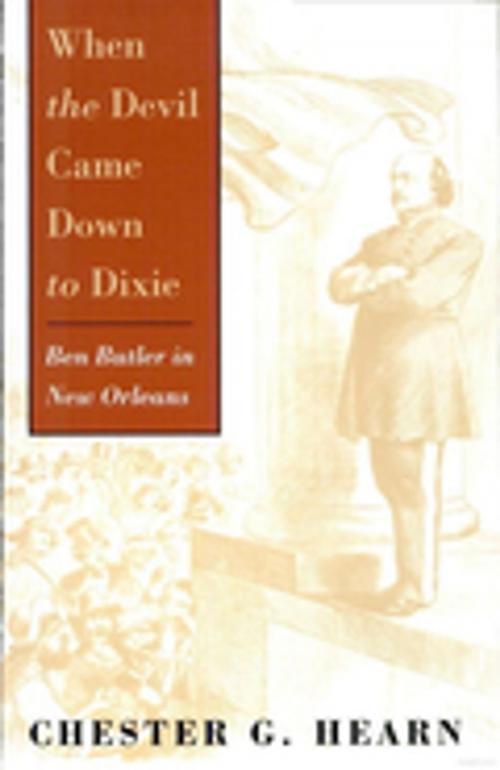When the Devil Came Down to Dixie
Ben Butler in New Orleans
Nonfiction, History, Americas, United States, Civil War Period (1850-1877)| Author: | Chester G. Hearn | ISBN: | 9780807145814 |
| Publisher: | LSU Press | Publication: | October 1, 2000 |
| Imprint: | LSU Press | Language: | English |
| Author: | Chester G. Hearn |
| ISBN: | 9780807145814 |
| Publisher: | LSU Press |
| Publication: | October 1, 2000 |
| Imprint: | LSU Press |
| Language: | English |
Much controversy exists concerning Major General Benjamin F. Butler's administration in New Orleans during the second year of the Civil War. Some historians have extolled the general as a great humanitarian, while others have vilified him as a brazen opportunist, agreeing with the wealthy of occupied New Orleans who labeled him "Beast" Butler. In this thorough examination of Butler's career in the Crescent City, Chester G. Hearn reveals that both assessments are right.
As a criminal lawyer prior to entering politics, Butler learned two great lessons -- how to beat the rich and powerful at their own game, and how to succeed as a felon without being caught. In New Orleans, Butler drew on these lessons, visibly enjoying power, removing those who questioned his authority, and delighting in defeating his opponents. Because of his remoteness from Washington, he was able to make up his own rules as he went along, surrounding himself with trusted friends and family members who had no choice but to keep his secrets lest they incriminate themselves.
Butler made every effort to humble the rich, who abhorred him and whose sordid characterizations of his regime -- some true, some not -- became legendary. As Hearn explains, Butler's legacy of corruption clouded many admirable aspects of his administration. He championed the poor, many of whom would have starved had he not fed and employed them. He also established sanitation policies that helped rid the city of disease and saved the lives of thousands of New Orleans' less-fortunate.
Vividly describing Butler's childhood and his political career before and after the war, Hearn deftly places Butler's New Orleans reign in the context of his life. He also offers new information on Butler, including the first investigation of his suspicious accumulation of great wealth late in life.
In a fast-paced, colorful narrative, Hearn shows Butler to be a fascinating case study of contradictions, a remarkable man with a politician's appetite for wealth and power as well as a sincere empathy for the poor. All Civil War historians and buffs will savor this riveting, insightful portrait of the man behind "the Beast."
Much controversy exists concerning Major General Benjamin F. Butler's administration in New Orleans during the second year of the Civil War. Some historians have extolled the general as a great humanitarian, while others have vilified him as a brazen opportunist, agreeing with the wealthy of occupied New Orleans who labeled him "Beast" Butler. In this thorough examination of Butler's career in the Crescent City, Chester G. Hearn reveals that both assessments are right.
As a criminal lawyer prior to entering politics, Butler learned two great lessons -- how to beat the rich and powerful at their own game, and how to succeed as a felon without being caught. In New Orleans, Butler drew on these lessons, visibly enjoying power, removing those who questioned his authority, and delighting in defeating his opponents. Because of his remoteness from Washington, he was able to make up his own rules as he went along, surrounding himself with trusted friends and family members who had no choice but to keep his secrets lest they incriminate themselves.
Butler made every effort to humble the rich, who abhorred him and whose sordid characterizations of his regime -- some true, some not -- became legendary. As Hearn explains, Butler's legacy of corruption clouded many admirable aspects of his administration. He championed the poor, many of whom would have starved had he not fed and employed them. He also established sanitation policies that helped rid the city of disease and saved the lives of thousands of New Orleans' less-fortunate.
Vividly describing Butler's childhood and his political career before and after the war, Hearn deftly places Butler's New Orleans reign in the context of his life. He also offers new information on Butler, including the first investigation of his suspicious accumulation of great wealth late in life.
In a fast-paced, colorful narrative, Hearn shows Butler to be a fascinating case study of contradictions, a remarkable man with a politician's appetite for wealth and power as well as a sincere empathy for the poor. All Civil War historians and buffs will savor this riveting, insightful portrait of the man behind "the Beast."















